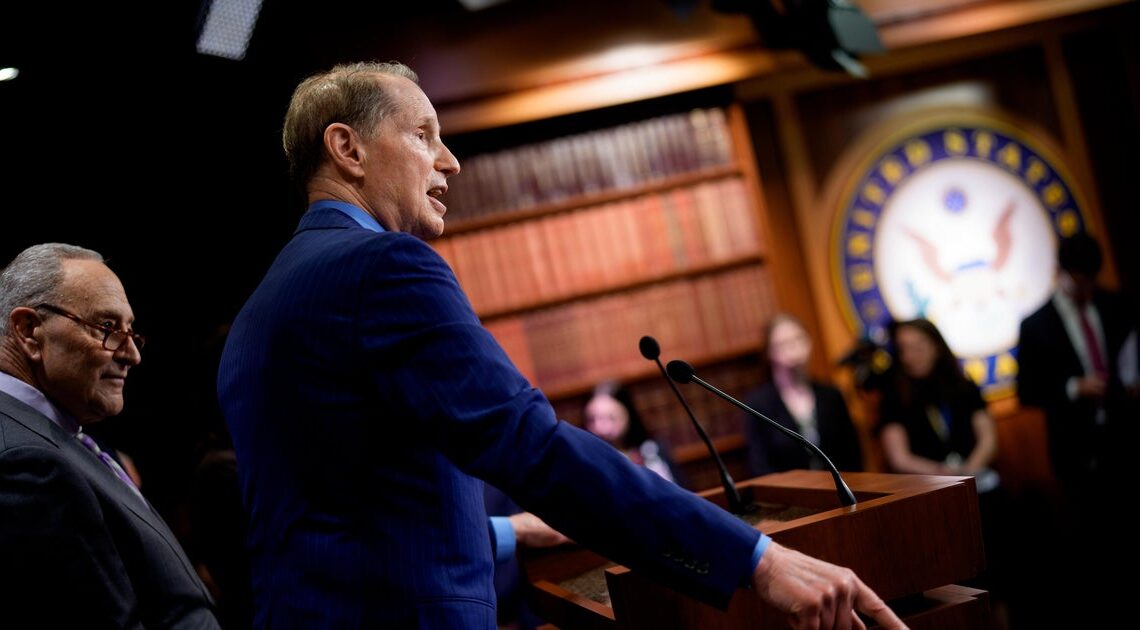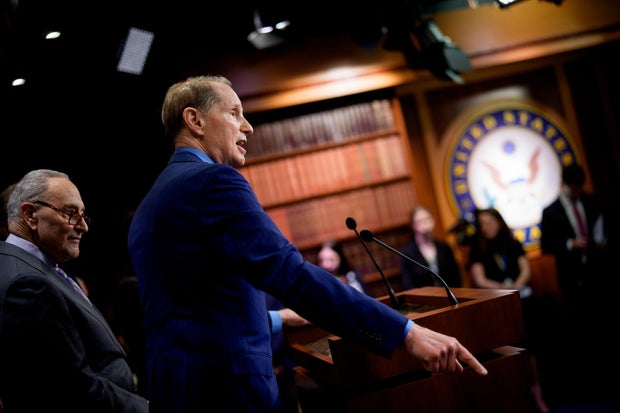
Senate to force vote aimed at blocking Trump’s “Liberation Day” tariffs
30. April 2025
Washington — The Senate is expected to vote Wednesday on a measure aimed at blocking President Trump’s “Liberation Day” tariffs amid anxiety over how the wide-ranging tariffs could disrupt the U.S. economy.
The resolution, led by Democratic Sen. Ron Wyden of Oregon and Republican Sen. Rand Paul of Kentucky, would terminate the April 2 national emergency that the president is using to impose the tariffs, effectively blocking the sweeping levies on foreign imports.
But the measure almost certainly won’t be taken up in the GOP-controlled House, making the vote largely a symbolic one.
On April 2, the president announced a 10% baseline tariff on almost all U.S. trading partners while increasing levies on dozens of other countries. Days later, as investors appeared spooked, Mr. Trump announced a 90-day pause on most of his new tariffs, keeping the 10% baseline in place while raising the tariff rate on goods imported from China.
Whether the measure would find enough support in the upper chamber remains to be seen. With 47 Democrats and independents in the chamber, it would require the support of at least four Republicans for approval.
Wyden told CBS News of the measure’s chances that “this is a choice for senators.”
“They’ve been home and they’ve heard from their constituents, like small businesses, that are getting clobbered by these tariffs,” Wyden said. “If they’re going to listen to their constituents, we’ll get their support, and if they’re more concerned about Donald Trump being mean to them, they’ll go with opposition.”
Andrew Harnik / Getty Images
Earlier this month, the Senate approved another resolution to block Mr. Trump’s tariffs on Canada, which fall under an earlier national emergency. At the time, four Republicans joined all Democrats and independents to support the measure — Sens. Lisa Murkowski of Alaska, Susan Collins of Maine and former GOP leader Mitch McConnell of Kentucky, along with Paul. The House did not vote on the measure.
Mr. Trump had put pressure on Senate Republicans to oppose the measure, calling out the senators expected to support it by name. But those senators held fast in their opposition.
Ahead of the vote this time around, U.S. Trade Representative Jamieson Greer and Vice President JD Vance joined the conference during their launch meeting on Tuesday, where senators said Greer told them the administration is making progress on trade deals.
Meanwhile, House Republican leadership has taken steps to quash efforts to block Mr. Trump’s tariffs. Earlier this month, Republicans included in a key piece of legislation a provision that would prevent members from forcing a vote to block the tariffs announced on April 2, after also doing so with the earlier tariffs. And any measure to roll back the tariffs would need the president’s signature, leaving opponents in Congress with little likelihood of reining in his levies.
House Speaker Mike Johnson said Wednesday that it isn’t appropriate for Congress to “jump in” a handful of weeks into the administration’s tariff policy, saying at an Axios event that “the executive has a broad array of authority that’s been recognized over the years” on trade. But he suggested limited openness to stepping in down the road.
“If it gets close to where the imbalance is there, then we would step in,” Johnson said, while adding that the first step would be for him to call the president to discuss the concerns. “But right now I think ultimately this policy is going to achieve the desired outcome and it’s going to be good for the country, and so we’re applauding that.”
Still, anxieties continued to run high over the economic impact of the tariffs. And economic growth slowed in the first quarter of 2025, the Commerce Department reported in its estimate of the nation’s gross domestic product Wednesday.
Senate Majority Leader John Thune told reporters Wednesday following the GDP report, “the tariff issue is one that’s probably going to take some time to realize the results and the benefits from.”
“Overall, the things we’re going to be doing to support a healthy economy, on taxes and regulations and energy, are going to have a positive impact long term,” Thune, a South Dakota Republican, said. “The tariff issue is something that’s, like I said, it’s an open question, but we’re giving them some space to negotiate and see if they can get some good deals.”
Asked whether Senate Republicans would successfully defeat the tariff measure ahead of the vote Wednesday, Thune said, “we’ll see.”
